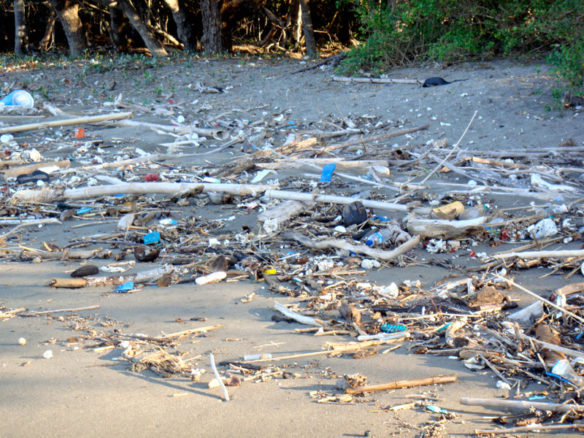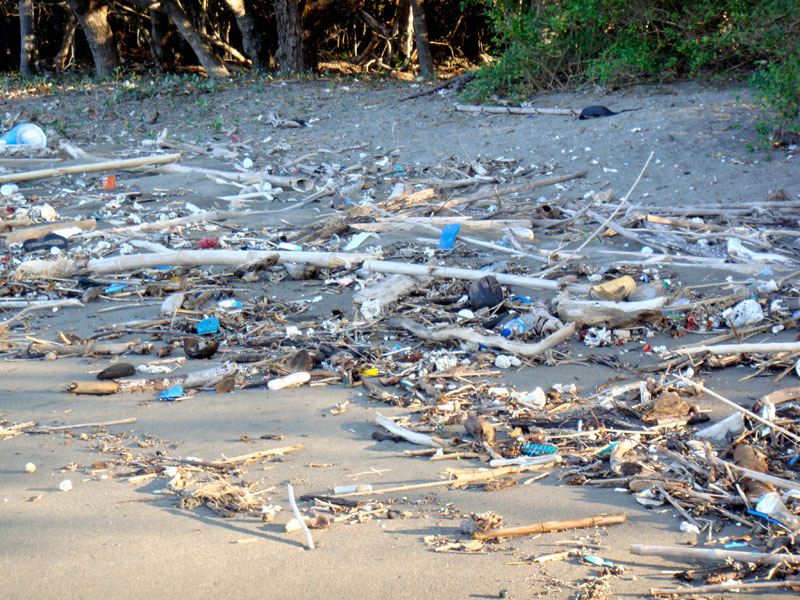
Indonesian National Park of the Komodo. Although uninhabited by people, and remote, Komodo island’s beaches are covered with plastic. Captions and Photo: © SAF — Coastal Care
Excerpts;
Indonisian idyllic blue waters are marred by rubbish, from styrofoam to dirty nappies embedded in the coral.
Uninhabited islands with the most beautiful bright white beaches, are camouflaged by a thick layer of plastic: flip flops, straws, disposable lighters, asthma inhalers, styrofoam and bottles in every size and shape. It tends to be these same items that wash up more than others – and not just in Indonesia…
Read Full Article, Independent (03-08-2018)
Plastic, plastic, plastic’: British diver films sea of rubbish off Bali; Guardian UK (03-06-2018)
Microplastics pollute most remote and uncharted areas of the ocean; Guardian UK (02-12-2018)
First data ever gathered from extremely remote area of the South Indian Ocean has a surprisingly high volume of plastic particles, say scientists. Currently scientists can only account for 1% of the plastic they think is in the ocean…
More than 8. 3 billion tons of plastics made: Most has now been discarded; Science Daily (07-19-2017)
Humans have created 8.3 billion metric tons of plastics since large-scale production of the synthetic materials began in the early 1950s, and most of it now resides in landfills or the natural environment, according to a study.
Plastic Island: How our throwaway culture is turning paradise into a graveyard, CNN (12-01-2016)
Here’s How Much Plastic Ends Up In the World’s Oceans,The Time (02-13-2015)
Every year, 8 million metric tons of plastic end up in our oceans, it’s equivalent to five grocery bags filled with plastic for every foot of coastline…
The Ocean Is Contaminated by Trillions More Pieces of Plastic Than Thought, IOP Science (12-08-2015)
This new study suggests there are 15 to 51 trillion micro plastic particles (those less than 200 millimeters in size) in the world’s oceans, weighing between 93 and 236,000 metric tons. This is about seven times more than scientists had previously estimated…
Biodegradable Plastics Are Not the Answer to Reducing Marine Litter, Says UN; UN News Center (11-23-2015)
Widespread adoption of products labelled ‘biodegradable’ will not significantly decrease the volume of plastic entering the ocean or the physical and chemical risks that plastics pose to marine environment, concluded a UN report released today…
More plastic than fish in the sea by 2050, Guardian UK (01-19-2016)
One refuse truck’s-worth of plastic is dumped into the sea every minute, and the situation is getting worse, according to a new report launched at the World Economic Forum today. New plastics will consume 20% of all oil production within 35 years, up from an estimated 5% today…
Plastic Pollution: When The Mermaids Cry, The Great Plastic Tide, Coastal Care
Washed out on our coasts in obvious and clearly visible form, the plastic pollution spectacle blatantly unveiling on our beaches is only the prelude of the greater story that unfolded further away in the world’s oceans, yet mostly originating from where we stand: the land…









